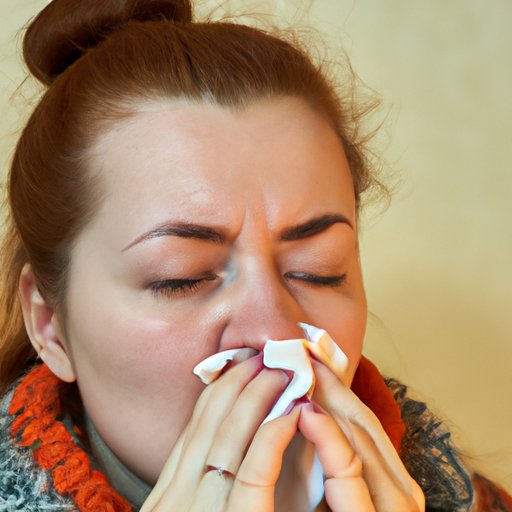
Introduction
Being familiar with cold symptoms is crucial as it can help identify and treat them early before they worsen. Cold is a common ailment that affects individuals of all ages worldwide. Understanding what cold symptoms are can enable you to distinguish a cold from other illnesses and take action promptly. This article explores the ABCs of cold symptoms, how to recognize them in their early stages, and remedies to help alleviate them.
Cold Symptoms 101: Understanding the Basics
A cold is a viral infection that affects the upper respiratory system. It is usually mild and goes away within a few days without medication. The common cold is caused by various strains of the rhinovirus and can be spread through droplets from the nose or mouth of an infected person. Common causes of colds include exposure to cold weather, weak immune systems, and contact with infected objects.

The ABCs of Cold Symptoms: Everything You Need to Know
Common cold symptoms include coughing, sneezing, a runny nose, sore throat, fatigue, mild fever, muscle aches, and headache. These symptoms often appear within one to three days of infection and can linger up to two weeks. While some cold symptoms are minor and can be treated with home remedies, others can be severe and require medical attention. If you experience difficulty breathing, chest pain, sudden dizziness, or high fever, you should seek medical attention immediately.
Signs of a Cold: How to Recognize Them Early and Take Action
Early warning signs of a cold include a tickling sensation in your throat, general fatigue, and a runny nose. Early recognition of cold symptoms is essential in preventing further spread of the virus to others. If you’re experiencing a cold, always cover your mouth when coughing or sneezing, wash your hands regularly, and avoid close contact with others.
A Closer Look at the Common Cold: What to Expect
The progression of cold symptoms varies from person to person. The first few days usually consist of a runny nose, sore throat, and a mild fever. As the infection progresses, you may experience a persistent cough, worsening sore throat, headache, and fatigue. In some cases, a cold can lead to complications such as sinus infections, bronchitis, or pneumonia.
The Top 5 Signs You Have a Cold and What to Do About Them
The top five common cold symptoms include coughing, sneezing, sore throat, runny nose, and fatigue. These symptoms can be treated at home using natural remedies such as drinking fluids, getting plenty of rest, using over-the-counter cold medicines, and warm compresses on the sinuses. Over-the-counter medicines such as pain relievers, nasal decongestants and throat lozenges can also help alleviate cold symptoms.
Are You Feeling Under the Weather? Recognizing the Symptoms of a Cold
If you’re experiencing a combination of symptoms such as coughing, sneezing, sore throat, runny nose, and fatigue, then you might have a cold. However, it’s crucial to differentiate a cold from other illnesses with similar symptoms such as the flu or allergies. Maintaining good hygiene practices, getting plenty of rest, and treating symptoms with home remedies can help alleviate cold symptoms.
Coping with a Cold: Identifying and Treating the Symptoms
Treating a cold involves resting, drinking fluids, and using over-the-counter cold medicines. A warm compress on the sinuses can also help alleviate symptoms such as a headache, sore throat, and coughing. Leading a healthy lifestyle that includes a balanced diet, regular exercise, and adequate rest can also help boost your immune system and prevent future colds. If your symptoms persist or worsen, seek medical attention to address any potential complications.
Conclusion
In conclusion, being familiar with cold symptoms is crucial in identifying and treating them early before they worsen. Knowing the ABCs of cold symptoms, early warning signs, and remedies to alleviate them can help you take swift action when experiencing them. Remember to practice good hygiene practices, rest, and drink plenty of fluids when treating a cold. Being aware of the progression of cold symptoms and possible complications can guide you in seeking medical attention when necessary.





